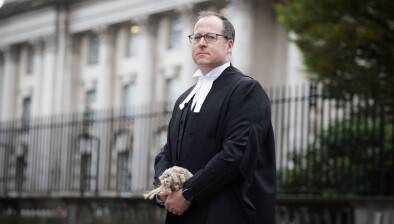NI: Court of Appeal: Man who sexually assaulted his two-year-old son loses appeal against conviction
A man who was convicted of sexually assaulting his two-year-old son while the child’s mother was at work has lost an appeal against his conviction.

About this case:
- Citation:[2019] NICA 7
- Judgment:
- Court:Court of Appeal
- Judge:Lord Justice Stephens
Finding that the trial judge had correctly admitted hearsay evidence in the interests of justice, Lord Justice Ben Stephens also dismissed the appellant’s complaints regarding the trial judge’s rulings and directions to the jury – stating that they were, if anything, overly generous to the appellant.
Background
In May 2011, QD was babysitting his son – who was 2 years and 7 months at the time. When the child’s mother, MC, returned from work, the child gave an account which was his description of a sexual assault on him committed by QD. MC confronted QD afterwards, and after initially denying it, QD said that she knew who he was and that he was not going to change – it was submitted this was in reference to a time when QD admitted to watching child pornography on her computer.
MC explained that she was too frightened of QD to report the sexual assault to police.
These allegations were reported to the police in 2015 after AP, another partner of QD, reported to police in England that QD had shown her child pornography and disclosed sexual offences which he had committed. AP described how QD, who she lived with in England, had asked her if she would have a child with him and allow him to sexually abuse their child. QD told AP “that he had had sex with his 3 year old son before his mother took him back to Poland”.
After AP’s report, the PSNI contacted MC who made a statement in September 2015. Thereafter, QD was charged with:
- Rape of a child under 13;
- Sexual assault of a child under 13;
- Possessing an indecent photograph or pseudo photograph of a child;
- A further count of rape of a child under 13 (added during the course of the trial).
At Newry Crown Court in September 2018, the trial judge withdrew the first and fourth counts from the jury. QD was found not-guilty of the third count, and convicted of sexual assault on a child under 13 contrary to Article 14 of the Sexual Offences (Northern Ireland) Order 2008.
QD was sentenced to five months in prison.
Hearsay evidence
MC and QD’s son had no recollection of the assault and so could not give direct evidence, however the prosecution applied to admit the hearsay evidence of MC as res gestae, or as being “in the interests of justice for it to be admissible”. The trial judge agreed, considering that it was highly unlikely the son “would have been in a position to invent or collude in any way with an allegation relating to an assault of this nature” or “would have understood exactly what was going on and would only have been in a position to report factually what had happened”.
As such, the trial judge did not exclude that evidence under either article 30 of the Criminal Justice (Evidence) (Northern Ireland) Order 2004 or article 76 of the Police and Criminal Evidence (Northern Ireland) Order 1989.
Court of Appeal
In the Court of Appeal, QB contended that the trial judge:
- Erred in admitting the hearsay evidence and failed to give consideration to the child’s competence to give evidence;
- Failed to direct the jury properly on how they should approach the hearsay evidence – that the jury should have be directed to exercise caution in evaluating the significant of what MC reported her son to have said, that they were required to assess the reliability of the utterances of a 2-year- and 7-month-old child, and that the jury may have had the impression that if they accepted MC’s account they should convict QD without scrutinising the maker of the statement.
QB also contended that the trial judge had erred in:
- Declining to sever count 1 from the indictment;
- Not discharging the jury after he withdrew counts 1 and 4;
- Failing to adequately direct the jury on the evidence of AP, ad that thee should have been a robust direction to ignore AP’s evidence in its entirety.
Giving the judgment of the Court, Lord Justice Stephens concluded that the hearsay ought not to have been admitted as res gestae; however, there was sufficient support for the child’s statement to MC for it to be admissible under article 18(1)(d) of the Criminal Justice (Evidence) (Northern Ireland) Order 2004, and for it not to be excluded under article 30 of that Order or under article 76 of PACE. In this regard, Lord Justice Stephens considered, inter alia, R v Riat & others [2013] 1 WLR 2592 and R v Clare.
Lord Justice Stephens said that, given the comprehensive nature of the directions given by the trial judge in the course of the short trial, the Court would “not entertain any concerns about the overall sufficiency of the directions and the safety of the conviction”. The court was also satisfied that the trial judge’s decision to refuse to sever count one was “well within” the discretion of the court.
Furthermore, Lord Justice Stephens said the trial judge gave “an emphatic direction that the jury were not to take into account the evidence of AP in relation to counts two and three” and could not be faulted for not discharging the jury.
Finally, stating that the trial judge’s directions could have been “overly generous to QD”, Lord Justice Stephens said the Court was satisfied the conviction was safe and dismissed the appeal.
- by Seosamh Gráinséir for Irish Legal News








